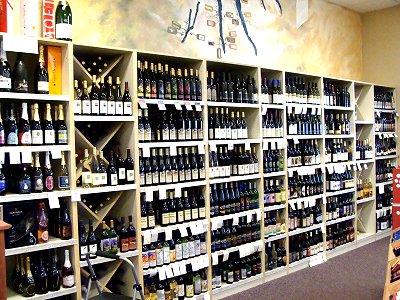- By Dan Veaner
- Business & Technology
 Print
Print  Julie Crowley says she is not an activist. Crowley, who owns Lansing's Triphammer Wines & Spirits , has been on a campaign to fight a piece of Governor David Patterson's budget proposal that would allow wine to be sold in grocery stores. She has contacted her customers, been interviewed on radio and for newspapers, and joined a state-wide coalition of wine retailers, vineyards, and others who oppose the legislation.
Julie Crowley says she is not an activist. Crowley, who owns Lansing's Triphammer Wines & Spirits , has been on a campaign to fight a piece of Governor David Patterson's budget proposal that would allow wine to be sold in grocery stores. She has contacted her customers, been interviewed on radio and for newspapers, and joined a state-wide coalition of wine retailers, vineyards, and others who oppose the legislation."I don't feel like I'm an activist," she says. "I'm just trying to be proactive in telling the story of the business owner side of things."
State officials argue that buying wine in grocery stores will increase wine sales, and generate $105 million in licensing fees for the state, which is considering 137 tax increases, new taxes, and fees to make up for a $15.4 billion deficit. They say liquor stores have a monopoly on selling wines and spirits and that consumers will benefit from the convenience of being able to buy wine where they purchase food. They note that 35 states currently allow wine sales in grocery stores. Proponentsalso say that the increased business will translate into more business for local wineries. But Crowley counters that grocery stores will carry what sells the most and fastest, no matter what they say about supporting local wineries.

A wall of local Finger Lakes wines greets customers when
they enter Triphammer Wines & Spirits
"Ithaca's a great wine market, so we're on the higher end of the average than, say, inner city where they do more spirits sales," she says. "A Wegman's may say they're going to support Finger Lakes wines and a year later there's going to be dust collecting on some bottles. They're not going to be there any more. In our store Finger Lakes Wines is the first thing you see when you walk in. We have a whole wall dedicated to Finger Lakes wines and we carry a lot of varietals from the wineries that won't get picked up by the grocery stores. And we hand sell those wines, so if people are interested we can tell them about the wine and the region. That's what we do."
Liquor store owners point out that they do not have a monopoly because there are more than 2,500 liquor stores in New York, independently owned. Business people are only allowed to own one single liquor store, and they compete against each other. On top of that it is the State that created the rules that small business owners have been following for years.
"We do things by the book," Crowley says. "It's a system and we play in the system and have made a living."
Liquor store owners wonder aloud why the State is attacking independently owned small local businesses that are forced to depend on wine sales for 60% or more of their income, especially during a time of economic crisis. They argue that 1,000 stores will be forced to close, eliminating an estimated 4,000 jobs. If that figure is right, it will mean more than a third of all liquor stores in New York State will be forced out of business. They point out that their businesses depend on wine to stay afloat, while the grocery stores are already profitable. They ask why the state wouldn't change the rules and give them time to change their business models before giving away their ability to compete.
"If you're going to do it and consumers demand it and the State wants to do it, and everyone's comfortable with the safety issues, put it all out on the table," Crowley says. "Ideally you would give the retailers a couple of years with the new rules to create a business model that could compete, and then bring the grocery stores in."
Crowley's store is one of the two biggest liquor stores in Tompkins County, which has a total of eight. She says that her store, with an equivalent of seven full-time jobs not counting herself, is not in danger of closing. Part of the reason for that is that she expanded her business a few years ago when she bought Gourmet Delight and turned it into Ithaca Coffee Company. That business opened a second location in downtown Ithaca last year. In addition to brewing coffee the store sells local beers, gift baskets and foods.
But Crowley says that because of strict state restrictions on selling wine and spirits, the business model is very different from that of a store that sells unrestricted products, and notes that liquor store owners don't want to sell milk and eggs.
"With the store next store we're hedging our bets," she says. "But it's going to cost me money. There is a lot of expense to retooling your business to compete. What about liquor -- can I sell liquor and cheese in the same store? Can I own six stores and ship product between the stores?"

Julie Crowley makes her case in an interview Tuesday morning
with WHCU News Director Geoff Dunn
The New York State Business Council, a kind of state-wide chamber of commerce, has come out in favor of allowing grocery stores to sell wine. "Gov. David Paterson's proposal to allow the sale of wine in grocery stores is good for the economy and good for consumers," says Kenneth Adams, president and CEO of The Business Council of New York State. Allowing supermarkets and grocery stores to sell wine will create new markets for upstate and Long Island wineries and convenience for consumers."
But Crowley complains that the council is siding with big business against small, and charges that the organization is biased. "The State Business Council has Wegmans and Price Chopper on their board," she says. "In my mind they are throwing small busines people under the bus. It's inconceivable that an organization to support business in the State of New York could be in favor of this legislation. The budget proposal is so about getting wine in the grocery stores -- there's nothing in it for the retailer. There is not a thing in there to transition the retailer into this new business model. There is no question that liquor stores will go out of business."
Crowley notes that the Tompkins County Chamber of Commerce passed a resolution against the proposal, and says that the state legislature has been supportive of liquor store owners. But she worries that as the details of the budget are worked out in a small committee that small business owners may be sold out in political deal-making. If that happens she says it will be impossible to defeat, because the likelihood of not passing the budget to save one item in it is small.
"A, I'm hoping it won't happen at all," she says. "B, I'm hoping if it does happen it will have been laid out. This is so sneaky and underhanded. It was snuck into the budget in the dark of night, and now three people in the State are sitting around a table figuring out what's in and what's out. The coalition is telling us we have a very strong position. The legislators are listening to local business people and chambers of commerce. But who knows who will throw us under a bus in a back room, because you want this other thing?"
Patterson has left no stone unturned in his search for new revenue for New York. He has proposed eliminating the middle class Star (property tax) rebate and decrease the amount taxpayers 65 and older are exempted. Before federal stimulus money he proposed cutting school aid by more than $20 million, and proposed changes to state health care programs, aid to local governments, environment and energy expenditures, human services, economic development, over $300 million in state workforce cuts, cuts to state universities and increases in tuition, closing prisons and cutting public safety programs, transportation, and changes to state lottery rules.
But to Crowley the issue is her ability to earn a living under state rules that could be severely slanted against them when the budget is passed next month. With 75% of her store's income coming from wine sales, the Governor's plan presents a serious threat to her livelihood. Her store has been a local family owned business for 68 years.
For now she is telling her story to anyone and everyone who will listen. Hoping for the best, she says she is unable to prepare for the worst, because the uncertainty about what will be allowed and what, if any, rules will be changed makes it impossible for her to plan ahead.
"You tell me what the rules are first," she says. "What are they? That's what is so unfair. It's inconceivable that any rational person at the State level would do this and then paint us as monopolistic and greedy. We compete with each other. It's really tough to think about Plan B when you don't know what the rules are."
----
v5i12




